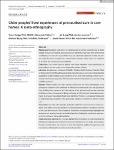Older peoples' lived experiences of personalised care in care homes: A meta‐ethnography
| dc.contributor.author | Hodge, G | |
| dc.contributor.author | Lang, I | |
| dc.contributor.author | Byng, R | |
| dc.contributor.author | Pearce, S | |
| dc.date.accessioned | 2023-11-28T13:33:18Z | |
| dc.date.available | 2023-11-28T13:33:18Z | |
| dc.date.issued | 2024-01 | |
| dc.identifier.issn | 1748-3735 | |
| dc.identifier.issn | 1748-3743 | |
| dc.identifier.uri | https://pearl.plymouth.ac.uk/handle/10026.1/21751 | |
| dc.description.abstract |
<jats:title>Abstract</jats:title><jats:sec><jats:title>Background</jats:title><jats:p>Guidance and policy on personalised (or person‐centred) care of older people living in care homes advocates that all residents must have their preferences considered, and that all care provided must be reasonably adjusted to meet the person's specific needs. Despite this, research that considers what matters to residents in terms of the care they receive is limited.</jats:p></jats:sec><jats:sec><jats:title>Objectives</jats:title><jats:p>Our review aims to explore care home residents' lived experiences of personalised care and understand what really matters to them.</jats:p></jats:sec><jats:sec><jats:title>Methods</jats:title><jats:p>Six electronic databases (CINHAL, Medline (Ovid), Embase, PubMed, Web of Science & PsychInfo) and Google Scholar (grey literature) were searched to identify qualitative studies relating to personalised care in care home settings, which also included resident (voices) quotes. The literature review and synthesis are reported using eMERGe guidance.</jats:p></jats:sec><jats:sec><jats:title>Results</jats:title><jats:p>Fifteen studies met the inclusion criteria for our meta‐ethnography. Four conceptual categories (the challenge of fitting into institutional care, the passing of time, holding onto a sense of self and a desire to feel at home) and two key concepts (creating a culture of purposeful living and caring and forming and maintaining meaningful & empowering relationships) were identified. Finally, a conceptual framework of understanding represents what personally matters to residents in terms of their care.</jats:p></jats:sec><jats:sec><jats:title>Conclusion</jats:title><jats:p>Our meta‐ethnography, guided by residents' lived experiences of personalised care, offers a new perspective of what personally matters to residents in terms of the care they receive. The conceptual framework of understanding highlights the importance of moving from an institutional position of doing for residents to a person‐centred position of doing with residents.</jats:p></jats:sec><jats:sec><jats:title>Implications for practice</jats:title><jats:p>Our findings highlight the importance of understanding the differences between personalised and person‐centred care for policy and practice. Further considerations are required on how this might be applied through nurse and care home professionals' education and work practices.</jats:p></jats:sec> | |
| dc.format.extent | e12585- | |
| dc.format.medium | Print-Electronic | |
| dc.language | en | |
| dc.publisher | Wiley | |
| dc.subject | care homes | |
| dc.subject | care professionals | |
| dc.subject | nurses | |
| dc.subject | personalised | |
| dc.subject | person-centred | |
| dc.subject | residents | |
| dc.title | Older peoples' lived experiences of personalised care in care homes: A meta‐ethnography | |
| dc.type | journal-article | |
| dc.type | Review | |
| plymouth.author-url | https://www.ncbi.nlm.nih.gov/pubmed/37899684 | |
| plymouth.issue | 1 | |
| plymouth.volume | 19 | |
| plymouth.publisher-url | http://dx.doi.org/10.1111/opn.12585 | |
| plymouth.publication-status | Published | |
| plymouth.journal | International Journal of Older People Nursing | |
| dc.identifier.doi | 10.1111/opn.12585 | |
| plymouth.organisational-group | |Plymouth | |
| plymouth.organisational-group | |Plymouth|Research Groups | |
| plymouth.organisational-group | |Plymouth|Faculty of Health | |
| plymouth.organisational-group | |Plymouth|Faculty of Health|School of Nursing and Midwifery | |
| plymouth.organisational-group | |Plymouth|Research Groups|Institute of Health and Community | |
| plymouth.organisational-group | |Plymouth|Research Groups|Institute of Translational and Stratified Medicine (ITSMED) | |
| plymouth.organisational-group | |Plymouth|Research Groups|Institute of Translational and Stratified Medicine (ITSMED)|CCT&PS | |
| plymouth.organisational-group | |Plymouth|REF 2021 Researchers by UoA | |
| plymouth.organisational-group | |Plymouth|Users by role | |
| plymouth.organisational-group | |Plymouth|Users by role|Academics | |
| plymouth.organisational-group | |Plymouth|REF 2021 Researchers by UoA|UoA03 Allied Health Professions, Dentistry, Nursing and Pharmacy | |
| plymouth.organisational-group | |Plymouth|Faculty of Health|Peninsula Medical School | |
| plymouth.organisational-group | |Plymouth|Research Groups|FoH - Community and Primary Care | |
| plymouth.organisational-group | |Plymouth|Research Groups|Plymouth Institute of Health and Care Research (PIHR) | |
| plymouth.organisational-group | |Plymouth|REF 2028 Researchers by UoA | |
| plymouth.organisational-group | |Plymouth|REF 2028 Researchers by UoA|UoA02 Public Health, Health Services and Primary Care | |
| plymouth.organisational-group | |Plymouth|REF 2028 Researchers by UoA|UoA03 Allied Health Professions, Dentistry, Nursing and Pharmacy | |
| dc.publisher.place | England | |
| dcterms.dateAccepted | 2023-10-19 | |
| dc.date.updated | 2023-11-28T13:33:18Z | |
| dc.rights.embargodate | 2023-12-6 | |
| dc.identifier.eissn | 1748-3743 | |
| dc.rights.embargoperiod | ||
| rioxxterms.versionofrecord | 10.1111/opn.12585 |


